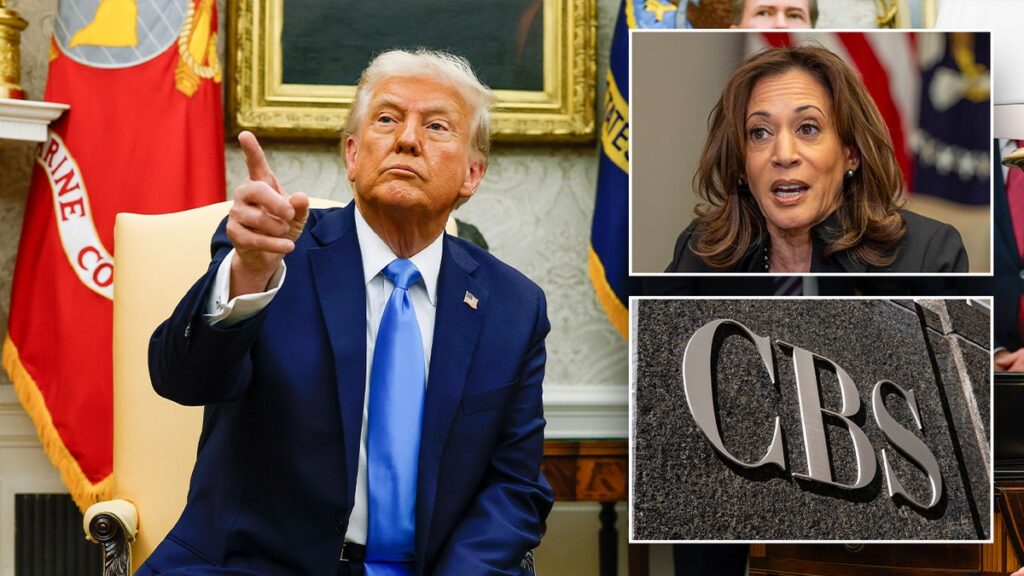The ongoing legal battle between former President Donald Trump and CBS News has escalated significantly, marking a concerning chapter in the relationship between media entities and political figures. Central to this controversy is Trump’s $20 billion lawsuit against CBS, stemming from the editing of a “60 Minutes” interview with Vice President Kamala Harris, which he claims caused him “mental anguish” and damaged his public image as a media figure.
The implications of this lawsuit are profound, not just for Trump and CBS but for the broader media landscape in the United States. As Trump seeks higher stakes in his legal confrontation, including a settlement that some insiders suggest could lead to uncomfortable compromises within CBS and potentially, the freedom of the press.
The Basis of the Lawsuit
According to legal documents filed in U.S. District Court in Amarillo, Texas, Trump’s argument against CBS rests heavily on the assertion that the network deceptively edited the interview to favor Harris, thereby misrepresenting the context and meaning of her statements. The controversy arose from two distinct clips aired on different programs, where Trump claims the edits led to confusion among viewers and ultimately harmed his political standing.
Trump’s attorney has articulated that the alterations to footage amount to a significant distortion of the truth that damaged Trump’s credibility as a public figure and impinged on his interests as a content creator. While CBS has vehemently denied these accusations, the lawsuit raises critical questions about the nature of editorial practices and their impact on public perception in a politically charged environment.
Media Integrity Under Threat
Veteran CBS correspondent Lesley Stahl, who has been a prominent voice on “60 Minutes” since its inception, expressed grave concerns about the erosion of media integrity as corporate interests collide with the principles of independent journalism. She has indicated a sense of impending loss regarding the network’s commitment to tough, fair reporting, especially in the face of Trump’s aggressive legal tactics.
In her discussions on public platforms, Stahl has conveyed the pressures faced by network executives amid settlement talks, remarking that the recent resignation of CBS News President Wendy McMahon and “60 Minutes” executive producer Bill Owens represents a stark indicator of the current state of affairs at CBS under the weight of political maneuvering.
A Case of Corporate Interest
The lawsuit also intertwines with significant corporate interests at play. CBS, owned by Paramount Global, is currently pursuing a merger with Skydance Media, a deal that has left shareholders concerned about potential breaches in journalistic ethics in exchange for corporate gain. Shari Redstone, the controlling shareholder of Paramount, is reportedly eager to settle the dispute with Trump to facilitate this lucrative merger, raising alarms about the willingness of corporate media to compromise integrity for profit.
Legal experts largely consider Trump’s lawsuit to be without merit, but as news organizations like CBS navigate the need to maintain profitability while adhering to journalistic standards, the stakes are becoming alarmingly high. It prompts a crucial reflection on the relationship between media narratives and political powers in the contemporary landscape.
Political Ramifications
Beyond the immediate legal and corporate implications, Trump’s actions have broader political ramifications that affect public trust in the media. By targeting major news organizations, he has created an atmosphere where the press is increasingly viewed with skepticism, a strategy he openly acknowledges helps him deflect criticism.
Stahl recalls a chilling moment when Trump explained his combative relationship with the media, noting that such tactics aim to discredit unfavorable coverage by fostering doubt in the eyes of the public. The long-term effects of this erosion of trust pose significant challenges for journalists who strive to present the truth amidst a barrage of misinformation and skepticism.
Future of Journalism at Stake
As the legal battle unfolds, there is an urgent need to evaluate the future of journalism in light of corporate pressures and political influence. The anticipated settlement of Trump’s lawsuit could catalyze a shift in how media entities approach their coverage of political figures, especially those who wield significant power and influence.
The ongoing discussion brings forth weighty implications not only for CBS but for the journalistic community at large. The ability of news organizations to serve as impartial observers in democratic societies is at risk when profit motives supersede the pursuit of factual reporting.
The Importance of Independence
Amid these challenges, prominent journalists, including Stahl, underscore the importance of maintaining journalistic independence. There is hope that new corporate leadership, like that being proposed by Skydance, will recognize and prioritize the role of a free press as an essential component of democracy, even as the realities of corporate influence loom larger.
“The public doesn’t seem to want what we do to be part of our public life.” – Lesley Stahl
The ongoing narrative of Trump’s litigation against CBS is not merely a lawsuit; it serves as a litmus test for media resilience in the face of political pressure. The outcomes could have lasting effects, shaping not only the landscape of journalism but also the extent to which audiences trust the media that informs them.
As discussions continue around the settlement and its potential implications, many in the industry await to see how the pressures will ultimately shape the integrity of journalism moving forward.
The implications of Trump’s strategies on the media are profound. The stakeholders involved must prepare to defend the principles of a free and independent press, as they navigate the treacherous waters of corporate and political interests in the years to come.
The overarching question remains whether media organizations will prioritize their commitment to the truth or capitulate to the pressures exerted by those in power.

